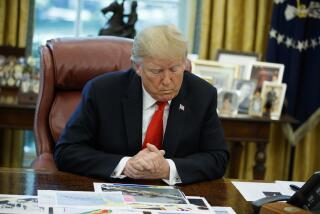Bush Overrules EPA to Ease Clean Air Regulation for Industry
WASHINGTON — President Bush has overruled the Environmental Protection Agency and approved a major concession to industry in an important regulation of the new Clean Air Act.
The decision, made last week by the President but not publicly announced, would ease and speed up the approval process for industries when changes in plant operations would increase emissions of pollution beyond those specified in their permits.
According to a senior Administration official, White House Chief of Staff Samuel K. Skinner notified EPA Administrator William K. Reilly that Bush had not accepted Reilly’s argument that the 1990 law required that the public be notified and given an opportunity to challenge changes in emissions.
Industry officials argued that such changes would be relatively small and should not be open to public challenges.
Reilly has agreed to issue the no-notice regulation only after the Justice Department renders a formal opinion supporting its legality, officials said. But the EPA chief reportedly has given up any hope of winning the battle.
Officials said with the nation just emerging from a recession and the White House emphasis on deregulation, Bush was loath to impose burdens on industry that his advisers thought were too heavy.
The dispute is the latest test of Bush’s pledge to be “the environmental President,” with environmental activists arguing that he is using the rule-making process to gut a law that he took pride in pushing through Congress.
Bush pledged during the 1988 campaign to revise the Clean Air Act and has cited the revisions as one of his major domestic achievements.
But since then, the economy has soured and, as he runs for reelection, Bush has given far more attention to helping business and industry, which lobbied heavily against the EPA’s original interpretation that the public must be notified of emission changes.
In its Clean Air Act Amendments of 1990, Congress set out broad guidelines for control of urban smog, acid rain and toxic emissions. The EPA was delegated responsibility for drafting the detailed rules for bringing industry in compliance with the law.
More to Read
Get the L.A. Times Politics newsletter
Deeply reported insights into legislation, politics and policy from Sacramento, Washington and beyond. In your inbox three times per week.
You may occasionally receive promotional content from the Los Angeles Times.










